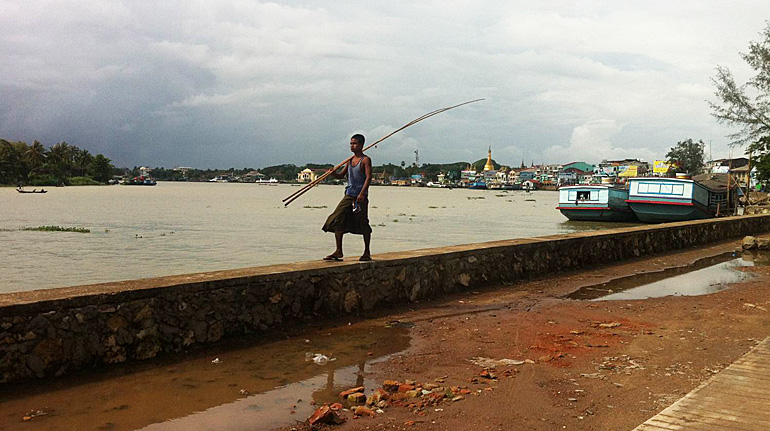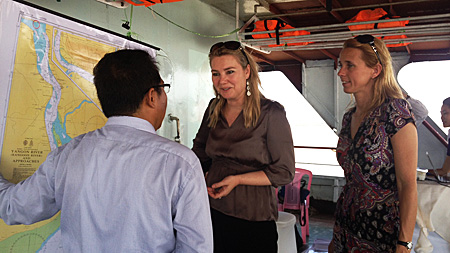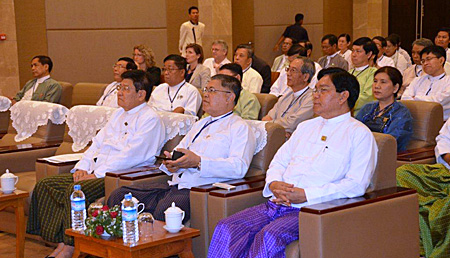Joint action plan to boost modernisation of Myanmar's water management and flood control
 “Two decades without serious education of new civil engineers and the a large number of ministries and departments involved in flood protection and water management without proper collaboration and cooperation between them", that struck Marjan Kreijns of the Delft University of Technology most at the joint Dutch-Myanmar seminar on safe and sustainable water management in the capital city Nay Pyi Taw, Myanmar on 29 May.
“Two decades without serious education of new civil engineers and the a large number of ministries and departments involved in flood protection and water management without proper collaboration and cooperation between them", that struck Marjan Kreijns of the Delft University of Technology most at the joint Dutch-Myanmar seminar on safe and sustainable water management in the capital city Nay Pyi Taw, Myanmar on 29 May.
During the seminar Myanmar and Dutch water experts discussed the urgent need for integrated water resources management in order for the Myanmar governance to modernize its aged water infrastructure.
Within three months a first outline of a joined Myanmar-Dutch action plan should be ready and a formal steering committee with members from both countries will lead the newly established cooperation between the Myanmar National Water Resource Committee and the Dutch Ministry of Infrastructure and Environment.
The action plan is seen as a first step towards integrated water resource management including components as institutional reforms, financing structures and capacity building.
Obsolete water infrastructure
Kreijns works for the Valorization Centre of the Delft University of Technology and visited Myanmar on various occasions since 2008. During these visits she became one of the first foreign water experts
to learn about the obsolete water treatment plants and breached dikes that remained unrepaired after cyclones Nagris (2008) and Giri (2010), devastated large parts of the Irriwaddy river delta.

Dr. Zaw Lwin Tun,director of irrigation (left) explains the institutional
needs in Myanmar to Dutch minister Melanie Schultz van Haegen
(middle) and Marjan Kreijns (right)
Capacity building
“At the seminar our Myanmar counterparts made very clear that they urgently need capacity to be able to modernize their water infrastructure”, adds Kreijns. During the seminar she noticed the wide knowledge gap. “Hardly any new knowledge has entered the country. For the current water managers it will be necessary to organize refreshment courses updating them on the latest technologies and developments of integrated water resources management. At university level a updated curriculum needs to be developed first and lecturers trained to enable the education of an complete new generation of water managers”.  Prioritizing the first actions
Prioritizing the first actions
According to Kreijns there is a lot to do in Myanmar. “The Myanmar participants of the seminar were very eager to learn and wanted to start the modernization immediately. But they shall have to prioritize things. We agreed that a master plan is needed, based in the concept of integrated water resource management. We have offered Dutch water expertise to help them to develop such a plan and to prioritize the first steps.”
High resolution global hydrological model
One of the options discussed by the Delft University of Technology for a Myanmar-Dutch cooperation is the establishment of an information system, including a data bank for example by participation in the Ewatercycle project. This project combines the latest modeling technology , enabling a high resolution global hydrological data collection and presentation including lateral flow groundwater. The model uses massive amounts of satellite data. The Delft University of Technology showed at the seminar a demo video of the Ewatercycle system using as part of a flood warning system for the Irriwaddy river.
Professor Nick van de Giesen of TU Delft explains the Ewatercycle system and its potential for flood protection, e.g. for Myanmar's city of Mandalay, situated along the Irriwaddy river.
More information
Ministry of Infrastructure and environment
The Hague, the Netherlands
+31 77 465 67 67
www.government.nl/issues/water-management
Delft University of Technology
Marjan Kreijns, Valorisation Centre
Delft, the Netherlands
+31 15 278 29 66
www.tudelft.nl/en/cooperation/opportunities



